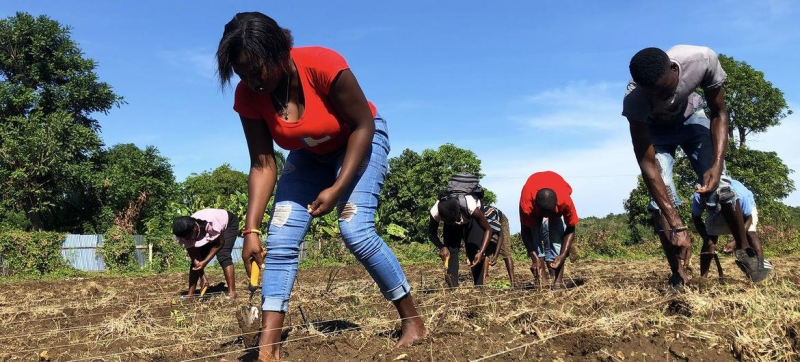- RMG workers block Dhaka-Mymensingh highway for Aug salary |
- Netanyahu, we're not leaving Gaza City: Palestinians |
- JUCSU voting in progress in a festive mood |
- Exporters to import duty-free raw materials: NBR Chairman |
- Gaza aid flotilla activists say second boat hit by suspected drone |
From Crisis to Cultivation: Haiti’s Farmers Build Resilience

Members of a farming association in Jérémie plant black beans.
For years, low-quality seeds have been a concern in Haiti, with continual climate shocks and political insecurity adding to the challenges farmers face in growing food.
Instead of having seeds that sprout reliably, farmers contend with batches that may grow only 40 to 50 percent of the time. This not only reduces their yield and profit but also weakens their ability to sustain their livelihoods.
The Food and Agriculture Organization (FAO) is working with Haiti’s Ministry of Agriculture to change this by localizing the seed economy and training members of organised seed banks known as Groupements de Production Artisanale de Semences (GPAS).
“We realised that most seeds were of doubtful quality, meaning they were not adapted to certain climate conditions… as long as they are not well-adapted and of good quality, production will be weak,” said Pierre-Frantz Jacques, a former farmer and FAO seed bank project manager.
There are now over 200 GPAS across Haiti, cultivating high-quality seeds to distribute to farmers with the goal of increasing yields and reducing dependency on foreign seed and food imports.
These groups play a vital role, especially now, as more than half the country faces emergency food insecurity and agricultural production is threatened by armed violence amid rising gang activity.
“GPAS, by providing quality seeds, contributes to improved agricultural productivity and food security in communities,” Mr Jacques added.
About two-thirds of Haiti’s population depends on agriculture for their livelihoods, mostly small farmers. However, due to recent globalising forces, these farmers produce only 40 percent of the country’s food, creating an untenable food situation and increasing reliance on imports.
Over past decades, various FAO programmes have supported seed production as a way to reduce the trade deficit. The GPAS programme was revitalised in 2010 following the devastating 7.0 earthquake that struck Haiti and its agricultural sector.
During the humanitarian crisis, while providing emergency aid, FAO also began planning how to rebuild the agricultural sector.
“Immediately, resources from humanitarian assistance must be dedicated to resilience activities. You have to prepare for later from the beginning,” said Pierre Vauthier, FAO’s Representative in Haiti.
In 2010, it became clear that Haiti’s seed systems were insufficient, with many farmers reliant on external sources and low-quality seeds flooding the market.
GPAS stepped in by providing high-quality, first-generation seeds (semences de base) to jumpstart farmers’ enterprises. The groups were also trained in best practices for cultivation, harvesting, and financial management.
While relying on scientific research and technology, the programme also draws on local knowledge of ecosystems.
Ultimately, it is the GPAS farmers who select seed varieties, often choosing local species already well-adapted to the environment and part of local traditions.
“Farmers and locals know their environment—the soil, the climate—and this knowledge is passed down through generations,” Mr Jacques said.
FAO also provides seed banks with silos and tools to ensure proper storage, crucial during climate shocks to protect stocks despite extreme weather.
“We consider seeds an adaptation tool that allows farmers to cultivate even under extreme conditions,” Mr Jacques explained.
Mr Vauthier said programmes like GPAS lie at the heart of FAO’s mission—not just facilitating humanitarian aid, but building self-sustaining communities.
“Resilience can restore dignity to communities. It changes the mindset from being assisted to taking control of one’s own life,” he said.
Haiti faces a protracted crisis: 1.3 million displaced, nearly six million in emergency food insecurity, looming climate shocks, and violent gangs terrorising communities.
In this context, it may seem surprising that one seed matters. But for FAO, small, locally sustainable changes often lead to lasting progress.
Seed banks, according to Mr Jacques, reduce farmers’ dependency on others and strengthen autonomy and food security.
“What happens is that farmers become capable of producing their own seeds, which reinforces autonomy and food security,” he said.

